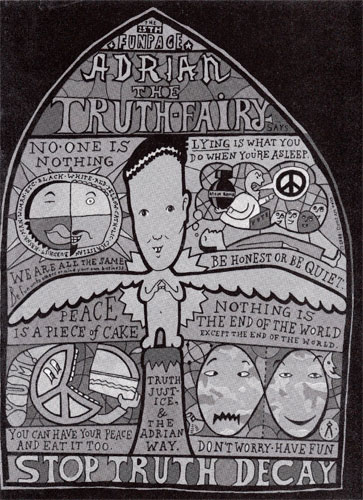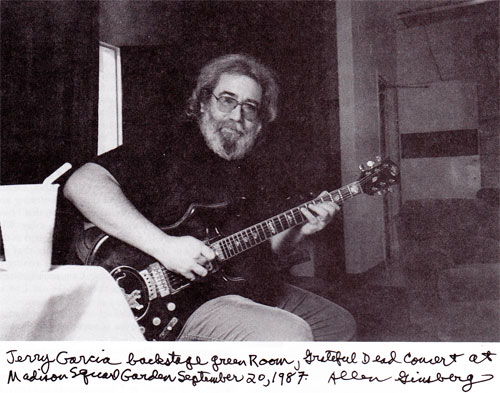Barbara Meier and Jerry Garcia were friends in the early sixties when they were part of a community of poets, pacifists, and folksingers in Menlo Park, California. Jerry went on to become a founding member of the legendary band, The Grateful Dead, and Barbara became a member of the San Francisco Zen Center under Shunryu Suzuki Roshi. In 1974, she moved to Boulder, Colorado, to study Vajrayana Buddhism with Chogyam Trungpa Rinpoche and to be part of the Naropa Institute Creative Writing community. She is the author of a book of poetry, The Life You Ordered Has Arrived. After many years of being out of touch with each other, Barbara and Jerry had this conversation in June of 1991 when the Dead played in Denver.
Barbara Meier: I remember reading Ram Dass describe you as a bodhisattva.
Jerry Garcia: He’s very kind, but I don’t deserve that. I’m just a guy trying to play the right notes, that’s all. If I were to think of myself in a spiritual context, however, I’d think of myself as some sort of Buddhist.
Barbara Meier: Well, music is your practice. When I hear you in concert, I feel you want to push the energy further and further, taking the crowd along with you.
Jerry Garcia: I don’t do it consciously.
Barbara Meier: You must be aware of it.
Jerry Garcia: Only because of the feedback, because of the endless reportage. It’s like UFOs: if enough people say “I saw one the other night; they’re spinning around,” even if I haven’t seen one myself, I start thinking there must be something out there.
Barbara Meier: No intentionality?
Jerry Garcia: Not really. From my point of view, it’s all a bead game. My finest moments have been as part of an audience in a musical situation, or as a performer, when things are unfolding in a graceful way. It’s one of those moments of grace that humans get to experience. When that happens, no one enjoys it more than I do. And when it’s just hard work, that works for me, too.
There are times when I feel I’m playing way below what I’m capable of, and I think, “Well, this whole evening is a giveaway. I never played at the edge of my ability.” I used to hear guys like Pablo Cassals say, “If I don’t play for a day I can tell, if I don’t play for a week my wife can tell, if I don’t play for two weeks everybody in the world can tell,” and I used to think “Ah, come on. . . .” But now I recognize what they’re talking about. It’s a purely technical thing—something my muscles do.
Barbara Meier: I remember you practicing the guitar twelve hours a day.
Jerry Garcia: As far as I know that’s the only way you get good. When you play music, you know how good or how bad you are and what you can or cannot do. And I’m still surprised more people stay than leave. That’s totally baffling.
Barbara Meier: Not only stay, but keep arriving. So what is the Grateful Dead all about?
Jerry Garcia: It varies through time. We’re just trying to play music; it really isn’t any more complicated than that.
Barbara Meier: But there’s this other thing happening.
Jerry Garcia: Yeah, and that has a consciousness of its own, and we’re invented by it. It’s really just a continuation of those old days. Everybody’s gotten older and is doing other things in their lives, but we really never decided to go somewhere or become something. As we go along and gain larger and larger illusions of success, it requires more and more preplanning, and we have to spend more time investing consciousness into the fiction of the corporation. Even though we’ve always operated without an agenda, the hardest part is preserving the illusion of spontaneity. It gets to be more complex as it goes along, full of all kinds of complex ethical questions.
Barbara Meier: Like what?
Jerry Garcia: For example, is it fair to charge people $25 a ticket to go into an enormous stadium and see people on the stage this big? (Jerry holds his thumb and forefinger a half of an inch apart.) I don’t think it is, unless you’re able to create a good enough sound and a large enough image to play to the worst seat in the house.
Barbara Meier: But you do do that.
Jerry Garcia: We try. Another issue concerns the safety of the fans and their exposure, because a lot of people still come to our shows thinking it’s kind of a hole in reality where it’s okay to take drugs. But we can’t protect them. We have no control over the world at large. The police are going to do what they want. Some years the newspapers are full of Dead bashing; and yet there are also years when we gain something like respectability.
Barbara Meier: There’s this amazing nomadic tribal culture that has formed around the Dead.
Jerry Garcia: “Deadheads” aren’t that easy to pin down. They range from professionals doing hard scholarship to total street weirdos. That keeps it interesting, because the feedback is amusing. At the same time I feel guilty, because I wonder, “Isn’t there something real to think about out there? Aren’t there questions that people could be applying their valuable human energy to?” Getting involved with the Grateful Dead isn’t going anywhere except onward.
Barbara Meier: You don’t impose any political message.
Jerry Garcia: I couldn’t do it. The power is frightening.
Barbara Meier: Are you ever tempted?
Jerry Garcia: No. I thought, if I’m going to be onstage I’m not going to say anything to anybody or address the crowd, because it doesn’t matter what you say, sometimes just the sound of your voice might inadvertently set somebody off. The situation with psychedelics is so highly charged that you never know what’s leaking in. I don’t mind doing it in the music, because that’s where I divest myself of ego. It’s egoless, something I trust. If the band has something to protect, it’s the integrity of the experience, which remains shapeless and formless. As long as it stays that way, everything’s okay.

Barbara Meier: I got the sense that your real pleasure is getting to the” space jam” part of the show.
Jerry Garcia: That’s true, but I’m also a real rear-guard musician; I really like a simple song with simple accompaniment. Relating to your instrument is the first basic task. Then there’s the next thing: what’s everybody else doing? Are they together with their instruments? That has to happen to each individual, and then you can start addressing each other. The whole first part of the show is getting everything to work technically so you can hear everything and everyone’s attention is at the same place, more or less. By then it’s the middle of the show and we know everything is working, and it becomes time to actually do the thing. Sometimes we say, let’s do this and see what happens, and that gets us to a place that’s absolutely free.
Barbara Meier: Free improvisation?
Jerry Garcia: There’s no such thing as improvisation. There’s only composition. Only you do it quickly; you’re composing on the spot.
Barbara Meier: Is that an epiphany?
Jerry Garcia: It is and it isn’t. Luckily it’s okay with the audience if we fail. What they care about is that we take a chance.
Barbara Meier: Can you talk about your relationship to the shamanic aspect of the Dead?
Jerry Garcia: In the early psychedelic days all the power vampires of every description came out of the woodwork. What did I know? I was 24 years old, and all I had going was psychedelics and a sense of caution, a sense that there’s something valuable and important to protect. At that time I didn’t know there were people like Charlie Manson who would be willing to do anything to gain control. The power vampires are easier to recognize as time goes by. They change shape and form as your consciousness expands.
Barbara Meier: You must have learned ways to deal with it.
Jerry Garcia: You don’t deal with it; that’s how you deal with it.
Barbara Meier: One of the primary things traditional Vajrayana Buddhism teaches is how to create a protection system and set the boundaries so your mind can be free to expand. Some kinds of energies are very dangerous without protection.
Jerry Garcia: My reaction was instinctive.
Barbara Meier: So you winged it?
Jerry Garcia: And I got bumped and bruised. It’s hard to explain, because unless people have some contact with other levels of consciousness they don’t believe that any of this is real.
Barbara Meier: You mean that there’s a cotangent universe of spirits and energies, demons and goddesses?
Jerry Garcia: And everything else, you name it. And it can be just as frightening as your worst nightmare. The rewards of the exploration of consciousness are immense, but the scare is intense.
Barbara Meier: What are the rewards?
Jerry Garcia: Mainly the rewards of service. It’s a simple thing, the feeling of a job well done. There’s a workman-like quality that depends, I’m sure, on the same sensibility that makes the tea ceremony work, that kind of ritual of doing some simple task over and over again. It’s not a big thing, but it’s strong and important.
Thank you for subscribing to Tricycle! As a nonprofit, we depend on readers like you to keep Buddhist teachings and practices widely available.
